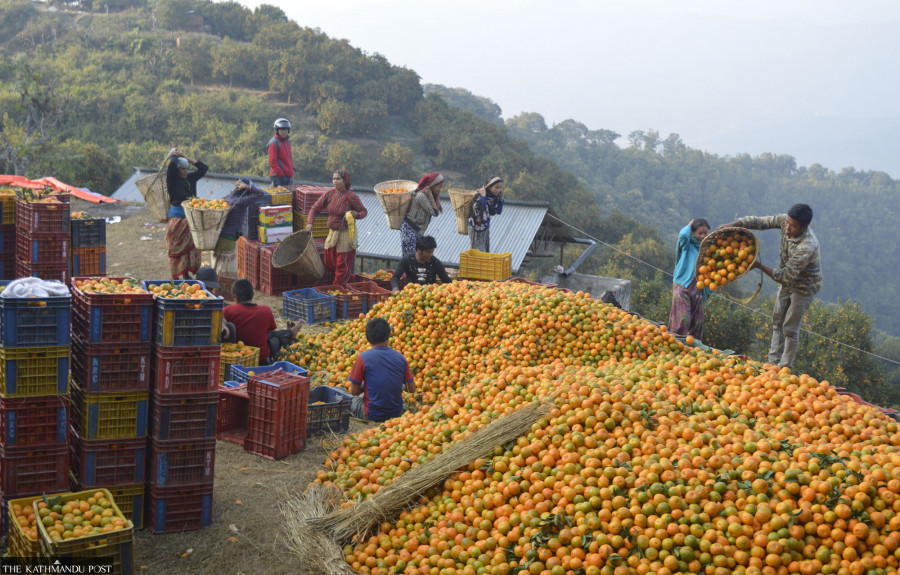
The rapid spread of the Omicron variant indicates that the pandemic will likely continue to disrupt economic activities in the near term, according to a World Bank forecast. POST FILE PHOTO
The World Bank has said that the global economy is entering a pronounced slowdown amid fresh threats from Covid-19 variants and a rise in inflation, debt, and income inequality that could endanger the recovery in emerging and developing economies.
Nepal is not an exception.
The multilateral funding agency in its Global Economic Prospects report published on Wednesday said Nepal’s economy may grow 3.9 percent this fiscal year, ending mid-July 2022, unchanged from its June 2021 outlook.
The rapid spread of the Omicron variant indicates that the pandemic will likely continue to disrupt economic activities in the near term, the World Bank said.
Risks to the outlook remain to the downside. The pandemic, and the emergence of the Omicron variant, could hinder economic activities by requiring additional mobility restrictions and undermining external demand, the report said.
Another risk stems from financing conditions. Further upward price pressures may cause inflation expectations to become unanchored, worsen domestic financing conditions, erode real incomes, and weaken the financial sector, according to the report.
“Obviously, there's so much uncertainty again. The virus has struck back,” said Hem Raj Regmi, deputy director general at the Central Bureau of Statistics, the national statistical organisation.
On the optimistic side, the Central Bureau of Statistics had predicted 6 percent growth for this fiscal year.
The higher growth forecast was made on the basis of the good agricultural harvest, particularly paddy and recovery of the service sector, especially tourism.
“The drop in the paddy harvest will cause a meaningful impact on the output growth,” said Regmi. “And again, the virus is back. Everything has become uncertain.”
Nepal on Wednesday reported 3,075 new coronavirus cases. On January 2, just 216 new daily cases were reported.
With the early signs of the third Covid-19 wave, Jassimuddin Mansoor, a tailor, is worried.
“I cannot imagine the next lockdown and closing of my business for months,” said Mansoor, proprietor of MP Tailor at Tripureshwor.
There are fears that if the third lockdown is enforced, it will collapse many businesses.
Gatherings of more than 25 people have been banned in three districts of Kathmandu Valley—Kathmandu, Lalitpur and Bhaktapur—starting Tuesday night, while vaccination cards have been made mandatory for everyone to access public amenities and avail services from government offices, with effect from January 21.
The district administration offices have said people should produce vaccination cards to enter public places like offices, hotels, restaurants, cinema halls, stadiums, airports and parks from January 21.
“These are light measures that the government has adopted to prevent the spread of Covid-19,” said economist Jagadish Chandra Pokharel. “Let’s hope there is no third lockdown.”
According to Pokhrarel, this is the good season for construction works.
“And if the caseload curves downwards by mid-February and the vaccination drive picks up pace, it may not harm the economy much,” he added.
Nepal’s economy has been in the doldrums right from the beginning of the fiscal year.
The inflow of remittance dropped for the fourth straight month of the fiscal year 2021-22 despite an increase in the number of outbound migrant workers with major employment destinations reopening their doors to foreign job seekers.
The country suffered a liquidity crunch [limited availability of loanable funds in the banking sector] and low capital expenditure by the government. As of January 11, the sixth month into the fiscal year, capital expenditure has remained below 10 percent.
The service sector has also not performed well.
Tourist arrivals continued their downward spiral in 2021, reaching the lowest level since 1977, as the coronavirus kept the industry paralysed despite several efforts to bring it back to life by relaxing entry restrictions. Hotels and restaurants are still struggling to operate.
Amid the depressed economic indicators, paddy harvest is also not good.
Nepal’s paddy harvest is expected to shrink to a five-year low to 5.13 million tonnes this fiscal year caused by unseasonal October rainfall and experts say it may cause further upward pressure on inflation and downward pressure on the economy.
Paddy is Nepal’s biggest earning farm commodity, with tens of thousands of farmers relying on its income.
As the government is struggling to ensure chemical fertiliser for winter crops and upcoming summer crops due to the cost factor—prices have gone up sharply globally—the agriculture sector is staring at a severe crisis.
A preliminary paddy output report released by the Ministry of Agriculture and Livestock Development recently, shows paddy output may drop 8.74 percent year-on-year this fiscal year, ending mid-July 2022.
The World Bank said that global growth is expected to decelerate markedly from 5.5 percent in 2021 to 4.1 percent in 2022 and 3.2 percent in 2023 as pent-up demand dissipates and as fiscal and monetary support is unwound across the world.
In addition, a notable deceleration in major economies—including the United States and China—will weigh on external demand in emerging and developing economies.
At a time when governments in many developing economies lack the policy space to support activity if needed, new Covid-19 outbreaks, persistent supply-chain bottlenecks and inflationary pressures, and elevated financial vulnerabilities in large swaths of the world could increase the risk of a hard landing, the multilateral funding agency said.
Nepal’s economy contracted by 2.1 percent in 2019-20 due to the surge in infections of Covid-19 as a result of strict containment measures in May and June 2021. The World Bank said Nepal may have grown by 1.8 percent in the last fiscal year ending mid-July 2021.
“The world economy is simultaneously facing Covid-19, inflation, and policy uncertainty, with government spending and monetary policies in uncharted territory. Rising inequality and security challenges are particularly harmful for developing countries,” said World Bank Group President David Malpass. “Putting more countries on a favourable growth path requires concerted international action and a comprehensive set of national policy responses.”













